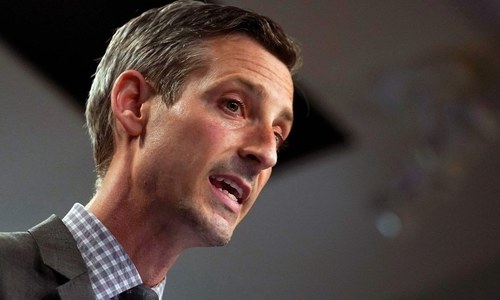National Security Adviser Moeed Yusuf expressed concern over the worsening situation in Afghanistan on Friday, terming it "extremely bad and out of Pakistan's control".
Briefing the Senate Committee on Foreign Affairs, he warned of an impending risk of an attack by Tehreek-i-Taliban, who, he said, could enter Pakistan disguised as refugees.
He, however, denied the presence of the Taliban in Pakistan as of now, terming the reports "Indian propaganda".
"India is financially facilitating the propaganda and agencies have even made arrests in this regard."
Yusuf said Pakistan was very concerned about the changing situation following the US drawdown and would be adversely affected by the growing violence and civil war in Afghanistan.
"The region's peace is conditional on peace in Afghanistan," he added.
Yusuf further said that the Afghan government needed to work on improving relations with Pakistan if it wanted peace in the country.
"[Also], I don't see the US offering a financial package to Afghanistan and in that case, only Pakistan can provide a trade route to the landlocked country," he said.
The national security adviser stressed that the UN Refugee Agency needed to set up camps for Afghan refugees.
'Power sharing to avoid civil war'
Foreign Minister Shah Mahmood Qureshi also briefed the committee, saying that Pakistan intended to suggest power sharing in Afghanistan to avoid civil war.
He added that in case of a civil war in Afghanistan, Pakistan would not be able to handle the influx of refugees. He further stated that Pakistan wanted 300,000 refugees in the country to return to their own countries.
He also affirmed that he would not be "apologetic" during an important conference on Afghanistan he was due to attend in Uzbekistan in the coming days.
Qureshi said Pakistan was not the only stakeholder in Afghanistan and would firmly present its stance in the conference.
"The situation in Afghanistan is worsening and holding Pakistan responsible for the [worsening] situation was not fair," he said.
The foreign minister said Taliban had objections over Afghan President Ashraf Ghani's participation in negotiations, adding that they were "intelligent and had grown wise" over time. He added that Taliban had changed after Doha talks.
The minister said Afghanistan lacked the resources to ensure its security and Pakistan would have to prepare for dealing with the changing situation in the war-torn country as India wanted to sabotage the peace process there.
He added that India neither wanted stability in Afghanistan nor in Pakistan.
"And we have informed America, European nations and others about this," he said.
The minister also said that another briefing to lawmakers on national security by the military leadership would be organised before Eidul Azha. An earlier briefing on the issue had taken place on July 1.
'Pakistan not isolated'
Qureshi said the impression that Pakistan had been isolated was wrong and US State Department spokesperson Ned Price's statement of the previous day was a testament to that.
"US State Department has termed Pakistan a 'helpful and constructive partner'," said Qureshi, quoting Price, and added this was coming from the US that once used to "point fingers" at Pakistan.
He further quoted Price as saying that the US and Pakistan had shared interests in peace and stability in Afghanistan and that the shared interest of both the countries went beyond Afghanistan.
The minister added that while the US had set a deadline of August 31 for pulling out all its troops from Afghanistan, it was willing to continue to work in the region and with Pakistan on broader counter-terrorism initiatives.
He went on to say that he was witnessing an "interesting change", with international bodies now conceding that a military solution was not possible in Afghanistan.
"But when [Prime Minister] Imran Khan said the same, he was labelled Taliban Khan," the foreign minister recalled.
He said the world acknowledging that a military solution in Afghanistan was not a viable option and agreeing that a solution to the Afghan problem was only possible through peacebuilding and rapprochement was the "success of Pakistan's perspective".
On the matter of the US drawdown, the minister said America needed to pull out its troops from Afghanistan in an orderly manner so as to ensure that there was no security vacuum left to be filled by "negative" elements in the war-torn country.
He added that the people of Afghanistan should decide their future.
"This is Pakistan's stance and in it lies Pakistan's best interest," he said.
The minister said the US had expressed willingness to work towards a solution through rapprochement, which he said was also Pakistan's stance.
"I am expecting a call from the US state secretary and I will inform him about Pakistan's stance," he added.
He warned that in case the situation in "Afghanistan goes back to what it was in the 1990s", Pakistan would have to deal with a refugee influx.
In this regard, he said, Pakistan would be monitoring illegal border crossing and was also fencing its borders.
"We have to manage things in a better manner to control terrorism," the minister remarked.
Qureshi added that he, the prime minister and security officials had had meetings with the Uzbeks, Tajiks and Hazaras so as to make it clear to them that "there is no favourite in Afghanistan".
"We want to play the role of a good neighbour and are not thinking about strategic depth [in Afghanistan]," he said. "Our policy on Afghanistan is clear. We want peace and stability in the country and not repeat our mistakes."
Qureshi also pointed out that US saw strategic rivalry with China as a challenge and Pakistan had a role to play in this regard.
Earlier in the session, PPP Senator Sherry Rehman said there were concerns over the situation in Afghanistan and the worsening scenario in the neighbouring country posed "major threats" to Pakistan.














































